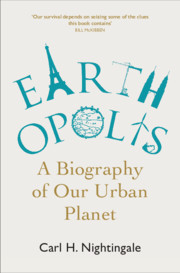Book contents
- Earthopolis
- Earthopolis
- Copyright page
- Dedication
- Contents
- Figures
- Maps
- Introduction Our Urban Planet in Space and Time
- Prologue Before and Beyond: Big Things in Tiny Places
- Part One Cities of the Rivers
- Chapter 1 Making Politics from Sunshine, Earth, and Water
- Chapter 2 Igniting Empire
- Chapter 3 Wealth for a Few, Poverty for Many I
- Chapter 4 Wealth for a Few, Poverty for Many II
- Chapter 5 How Knowledge Became Power
- Chapter 6 The Realm of Consequence
- Part Two Cities of the World Ocean
- Part Three Cities of Hydrocarbon
- Acknowledgments
- Notes
- Index
Chapter 1 - Making Politics from Sunshine, Earth, and Water
from Part One - Cities of the Rivers
Published online by Cambridge University Press: 10 May 2022
- Earthopolis
- Earthopolis
- Copyright page
- Dedication
- Contents
- Figures
- Maps
- Introduction Our Urban Planet in Space and Time
- Prologue Before and Beyond: Big Things in Tiny Places
- Part One Cities of the Rivers
- Chapter 1 Making Politics from Sunshine, Earth, and Water
- Chapter 2 Igniting Empire
- Chapter 3 Wealth for a Few, Poverty for Many I
- Chapter 4 Wealth for a Few, Poverty for Many II
- Chapter 5 How Knowledge Became Power
- Chapter 6 The Realm of Consequence
- Part Two Cities of the World Ocean
- Part Three Cities of Hydrocarbon
- Acknowledgments
- Notes
- Index
Summary
Chapter 1 of Earthopolis: A Biography of Our Urban Planet elaborates on both the myth of Inanna’s chaotic riverboat journey to Uruk and the vision of the goddess’s ordered urban state depicted on the Warka Vase to meditate on the many birthplaces and birthdates of cities and their surrounding “urban worlds.” It identifies river valleys (and other Sun and Earth-delivered sources of fresh water) as crucial to our ability to harvest enough energy from the Sun and Earth to build cities and it discusses the importance of “energized crowds” that arise in large, proximate, specialized, diverse, and anonymous settlements. Ultimately, though, the chapter argues that urban political communities and the especially powerful institutions of state required to govern them best account for cities' ultimate indefinability: their sheer variability and the sheer unpredictability of their human uses, ranging from immense acts of creation to immense acts of destruction. Cities, it concludes, are places where we harvest enough energy from the Sun and Earth, through water, to engage in the ambitious and dangerous human-directed practice of city-enabled politics – the polis of Earthopolis, the only Urban Planet we know of.
Keywords
- Type
- Chapter
- Information
- EarthopolisA Biography of Our Urban Planet, pp. 33 - 60Publisher: Cambridge University PressPrint publication year: 2022



